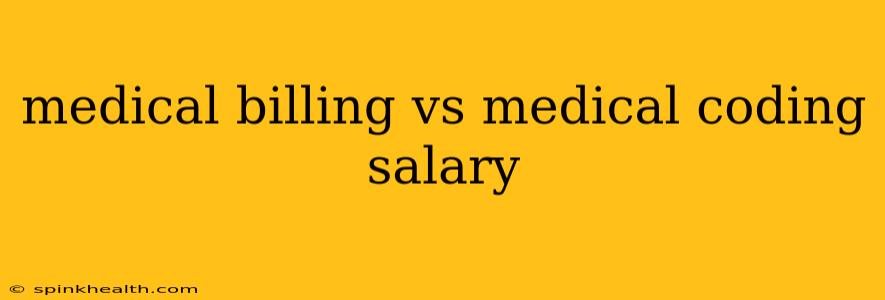Medical Billing vs. Medical Coding Salary: Unveiling the Earnings Potential
The healthcare industry is booming, and with it, the demand for skilled professionals in medical billing and coding. But which career path offers a higher salary? It's a question many aspiring healthcare administrators ponder. The truth is, the salary difference isn't always a clear-cut answer, as various factors influence earnings in both fields. Let's delve into a detailed comparison, exploring the intricacies of each role and their respective compensation.
Imagine two friends, Sarah and Emily, both embarking on careers in the medical field. Sarah, meticulous and detail-oriented, chooses medical coding, while Emily, outgoing and adept at communication, opts for medical billing. Their journeys, though intertwined in healthcare, lead them down distinct paths with varying financial rewards.
What is Medical Coding?
Medical coders are the unsung heroes behind accurate medical records. They translate complex medical diagnoses, procedures, and treatments into standardized alphanumeric codes (think ICD-10 and CPT codes). These codes are crucial for insurance claims processing, data analysis, and overall healthcare administration.
Sarah, our meticulous coder, spends her days meticulously reviewing patient charts, ensuring each code accurately reflects the services rendered. Her accuracy is paramount; a single incorrect code can lead to claim denials and revenue loss for the healthcare provider. The work requires intense concentration and a deep understanding of medical terminology and coding guidelines.
What are the job prospects for a medical coder? The Bureau of Labor Statistics projects substantial growth in this field, reflecting the ongoing need for accurate medical record-keeping.
What is Medical Billing?
Medical billers are the frontline communicators between healthcare providers and insurance companies. They prepare and submit claims, follow up on payments, and manage patient accounts. Think of them as the financial navigators of the healthcare system.
Emily, our communicative biller, enjoys the interaction involved in her job. She works closely with insurance companies, negotiating payments and resolving claim denials. Her skills in communication and problem-solving are essential to ensuring timely reimbursements for the healthcare provider. She’s a master at navigating the often complex web of insurance regulations and payment policies.
What are the job prospects for a medical biller? Similar to medical coding, the demand for skilled medical billers is strong, with ongoing growth projected by the Bureau of Labor Statistics.
Medical Billing vs. Medical Coding Salary: A Detailed Look
The salaries for medical billers and coders vary significantly based on several factors:
- Experience: Entry-level positions naturally command lower salaries than those with several years of experience.
- Education and Certification: While some entry-level roles might not strictly require certifications, obtaining credentials like Certified Professional Coder (CPC) or Certified Billing and Coding Specialist (CBCS) can significantly boost earning potential.
- Location: Geographic location plays a crucial role; salaries tend to be higher in areas with a higher cost of living and greater demand for these professionals.
- Employer: Large hospital systems or specialized medical practices often offer higher salaries than smaller clinics.
Generally speaking, experienced medical coders and billers with certifications often earn comparable salaries. However, in some cases, billers with strong negotiation skills and experience managing complex accounts may earn slightly more. While exact figures vary widely, it's not uncommon to see annual salaries ranging from the low $40,000s to well over $60,000 for experienced professionals in both fields.
Can Medical Coders Earn More Than Medical Billers?
Yes, this is possible. A highly experienced and certified medical coder working in a high-demand specialty area or a large organization could potentially earn more than a medical biller in a similar situation. However, the reverse is also true.
Can Medical Billers Earn More Than Medical Coders?
Yes, this is also possible. An experienced medical biller with strong negotiation skills, managing high-volume accounts for a large organization, can certainly earn a higher salary than some medical coders.
What Skills Are Necessary For a Successful Career in Medical Billing and Coding?
Both roles require a combination of hard and soft skills:
- Hard Skills: Medical terminology, anatomy and physiology, ICD-10 and CPT coding, insurance claim processing, software proficiency (Electronic Health Records – EHR).
- Soft Skills: Attention to detail, accuracy, problem-solving, communication (especially for billers), organizational skills, time management.
Conclusion: The Path to Higher Earnings
Ultimately, the salary potential in both medical billing and medical coding depends on a combination of factors. Choosing the right career path depends on your individual skills, interests, and career goals. Focusing on continuous learning, obtaining relevant certifications, and gaining experience in a high-demand area will significantly boost your earning potential in either field. The healthcare industry offers many opportunities for growth, and with dedication and the right skills, you can build a rewarding and financially successful career in medical billing or coding.

